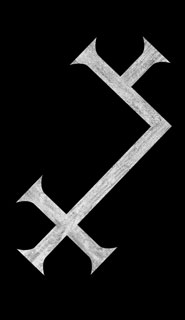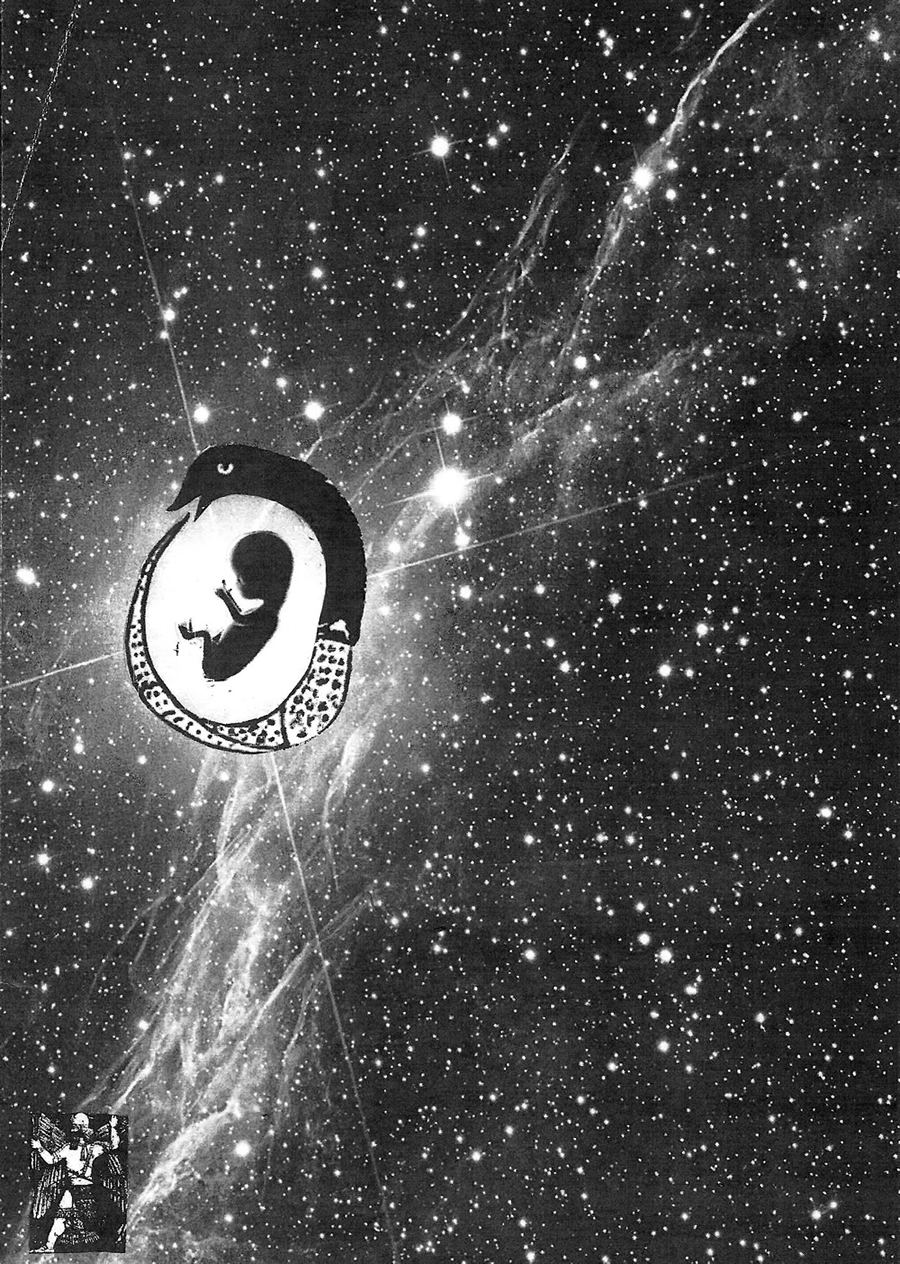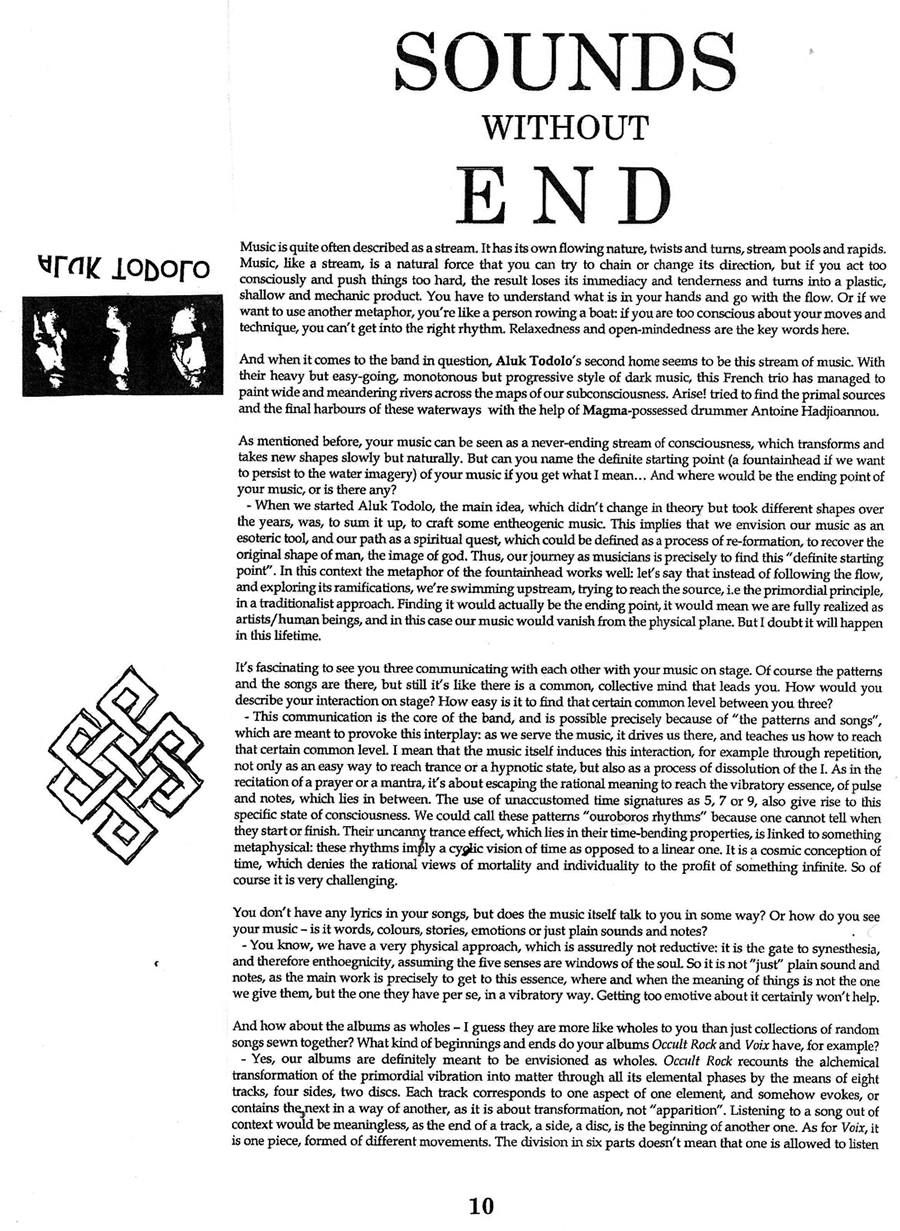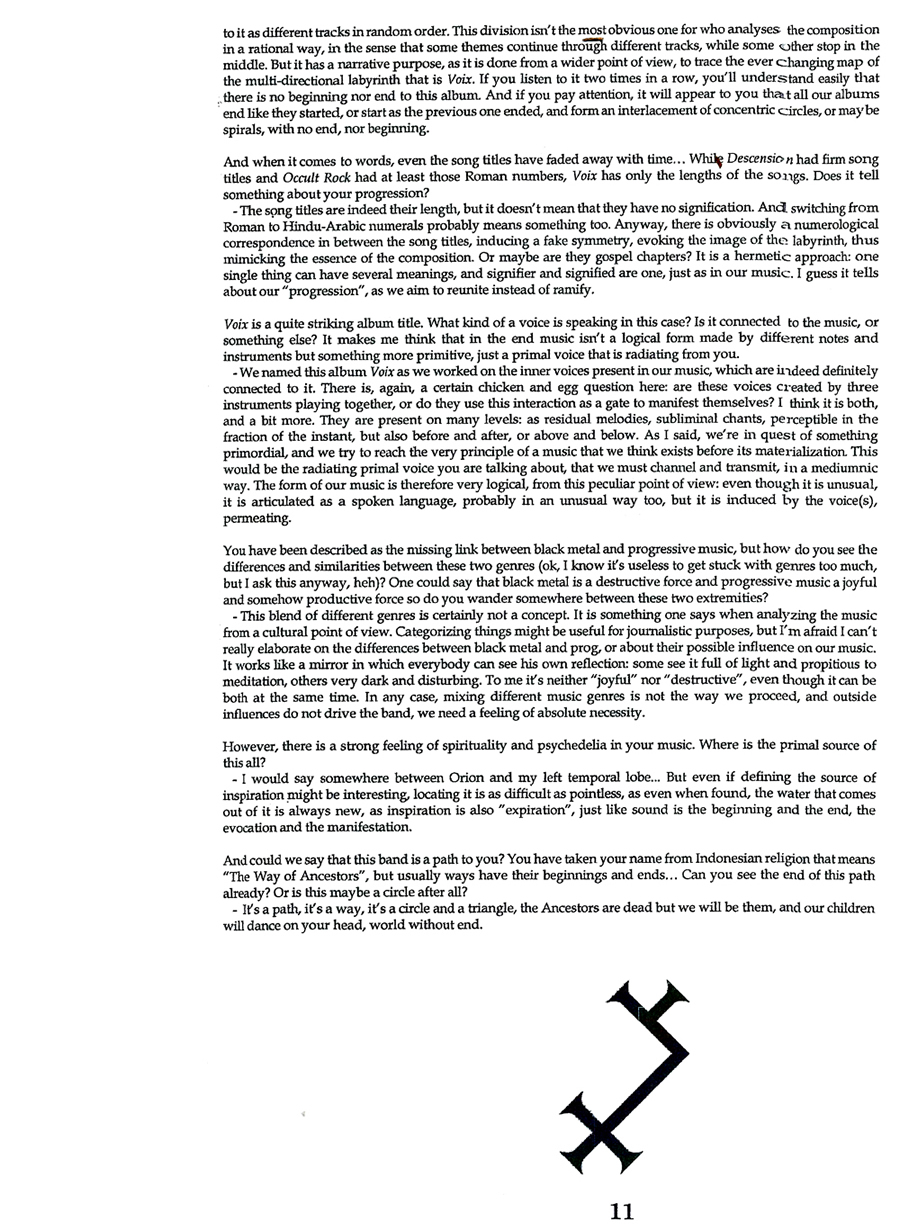2016-11 Arise !
Your music can be seen a neverending stream of consciousness, which transforms and takes new shapes slowly but naturally. But can you namethe definite starting point (a fountainhead if you want to call it that way) of your music if you get what I mean… And where would be the ending
point of your music, or is there any?
Antoine Hadjioannou: When we started Aluk todolo, the main idea, which didn't change in theory but took different shapes over the years, was, to sum it up, to craft some entheogenic music. This implies that we envision our music as an esoteric tool, and our path as a spiritual quest, which could be defined as a process of re-formation, to recover the original shape of man, the image of god. Thus, our journey as musicians is precisely to find this "definite starting point". In this context the metaphor of the fountainhead works well: let's say that instead of following the flow, and exploring its ramifications, we're swimming upstream, trying to reach the source, i.e the primordial principle, in a traditionalist approach. Finding it would actually be the ending point, it would mean we are fully realized as artists/human beings, and in this case our music would vanish from the physical plane. But I doubt it will happen in this lifetime.
It's fascinating to see you three communicating to each other with your music on stage. Of course the patterns and the songs are there, but still it's like there is a common, collective mind that leads you. How would you describe your interaction on stage? How easy is it to find that certain common level between you three?
AH: This communication is the core of the band, and is possible precisely because of "the patterns and songs", which are meant to provoke this interplay: as we serve the music, it drives us there, and teaches us how to reach that certain common level. I mean that the music itself induces this interaction, for example through repetition, not only as an easy way to reach trance or an hypnotic state, but also as a process of dissolution of the I. As in the recitation of a prayer or a mantra, it's about escaping the rational meaning to reach the vibratory essence, of pulse and notes, which lies in between. The use of unaccustomed time signatures as 5, 7 or 9, also give rise to this specific state of consciousness. We could call these patterns "ouroboros rhythms" because one cannot tell when they start or finish. Their uncanny trance effect, which lies in their time-bending properties, is linked to something metaphysical: these rhythms imply a cyclic vision of time as opposed to a linear one. It is a cosmic conception of time, which denies the rational views of mortality and individuality to the profit of something infinite. So of course it is very challenging.
You don't have any lyrics in your songs, but does the music itself talk to you in some way? Or how do you see your music – is it words, colours, stories, emotions or just plain sounds and notes?
AH: You know, we have a very physical approach, which is assuredly not reductive: it is the gate to synesthesia, and therefore enthoegnicity, assuming the five senses are windows of the soul. So it is not "just" plain sound and notes, as the main work is precisely to get to this essence, where and when the meaning of things is not the one we give them, but the one they have per se, in a vibratory way. Getting too emotive about it certainly won't help.
And how about the albums as wholes – I guess they are more like wholes to you than just collections of random songs sewn together? What kind of
beginnings and ends for example Occult Rock and Voix have?
AH: Yes, our albums are definitely meant to be envisioned as wholes. Occult Rock recounts the alchemical transformation of the primordial vibration into matter through all its elemental phases by the means of eight tracks, four sides, two discs. Each track correspond to one aspect of one element, and somehow evokes, or contains the next in a way of another, as it is about transformation, not "apparition" Listening to a song out of context would be meaningless, as the end of a track, a side, a disc, is the beginning of another one. As for Voix, it is one piece, formed of different movements. The division in six parts doesn't mean that one is allowed to listen to it as different tracks in random order. This division isn't the most obvious one for who analyses the composition in a rational way, in the sense that some themes continue through different tracks, while some other stop in the middle. But it has a narrative purpose, as it is done from a wider point of view, to trace the ever changing map of the multi-directional labyrinth that is Voix. If you listen to it two times in a row, you'll understand easily that there is no beginning nor end to this album. And If you pay attention, it will appear to you that all our albums end like they started, or start as the previous one ended, and form an interlacement of concentric circles, or maybe spirals, with no end, nor beginning.
And what comes to words, even the song titles have faded away with time… While Descension had firm song titles and Occult Rock had at least those Roman numbers, Voix has only the lengths of the songs. Does it tell something about your progression?
AH: The song titles are indeed their length, but it doesn’t mean that they have no signification. And switching from Roman to Hindu-Arabic numerals probably means something too. Anyway, there is obviously a numerological correspondence in between the song titles, inducing a fake symmetry, evoking the image of the labyrinth, thus mimicking the essence of the composition. Or maybe are they gospel chapters? It is an hermetic approach : one single thing can have several meanings, and signifier and signified are one, just as in our music. I guess it tells about our "progression", as we aim to reunite instead of ramify.
Voix is a quite striking album title. What kind of a voice are speaking in this case? Is it connected to the music, or something else? It makes me think that in the end music isn't so logical form made by different notes and instruments but something more primitive, just a primal voice that is radiating from you.
AH: We named this album Voix as we worked on the inner voices present in our music, which are indeed definitely connected to it. There is, again, a certain chicken and egg question here : Are these voices created by three instruments playing together, or do they use this interaction as a gate to manifest themselves? I think it is both, and a bit more. They are present on many levels: as residual melodies, subliminal chants, perceptible in the fraction of the instant, but also before and after, or above and below. As I said, we’re in quest of something primordial, and we try to reach the very principle of a music that we think exists before its materialisation. This would be the radiating primal voice you are talking about, that we must channel and transmit, in a mediumnic way. The form of our music is therefore very logical, from this peculiar point of view: even though it is unusual, its is articulated as a spoken language, probably in an unusual way too, but it is induced by the voice(s), permeating.
You have been described as a missing link between black metal and progressive music, but how do you see the differences and similarities between these two genres (ok, I know it's useless to get stuck with genres too much, but I ask this anyway, heh)? One could say that black metal is a destructive force and progressive music a joyful and somehow productive force so do you wander somewhere between these two extremities?
AH: This blend of different genres is certainly not a concept. It is something one says when analysing the music from a cultural point of view. Categorizing things might be useful for journalistic purposes, but I'm afraid I can't really elaborate on the differences between black metal and prog, or about their possible influence on our music. It works like a mirror in which everybody can see his own reflection: some see it full of light and propitious to meditation, others very dark and disturbing. To me it's neither "joyful" nor "destructive", even though it can be both at the same time. In any case, mixing different music genres is not the way we proceed, and outside influences do not drive the band, we need a feeling of absolute necessity.
However, there is a strong feeling of spirituality and psychedelia in your music. Where is the primal source of this all?
AH: I would say somewhere between Orion and my left temporal lobe... But even if defining the source of inspiration might be interesting, locating it is as difficult as pointless, as even when found, the water that comes out of it is always new, as inspiration is also "expiration”, just like sound is the beginning and the end, the evocation and the manifestation.
And could we say that this band is a path to you? You have taken your name from Indonesian religion that means ”The Way of Ancestors”, but
usually ways have their beginnings and ends… Can you see the end of this path already? Or is this maybe a circle after all?
AH : It's a path, it's a way, it's a circle and a triangle, the Ancestors are dead but we will be them, and our children will dance on your head, world without end.
|



